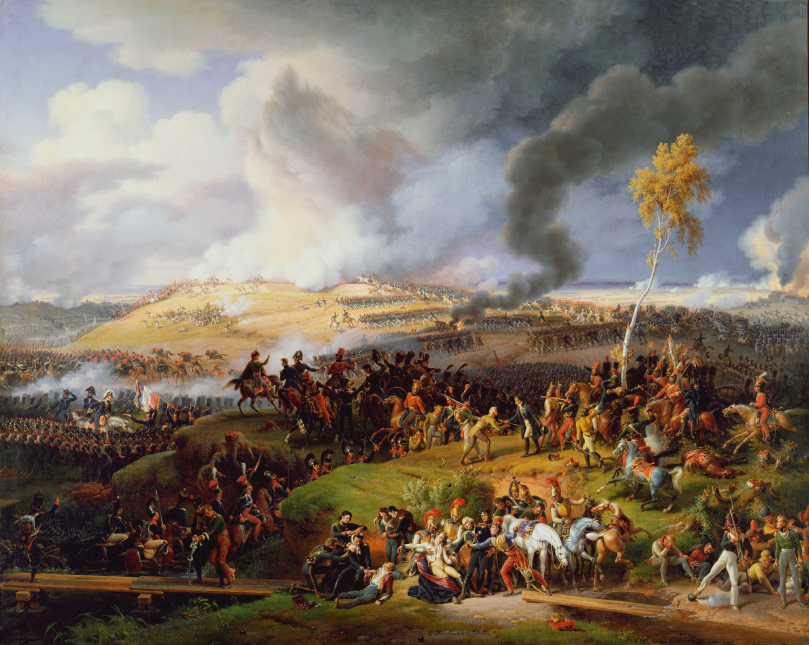
Anthony is currently a high school history teacher in New York City, New York. In addition to teaching, he has been published in several magazines and blogs such as “History is Now”, “Tudor Life”, “Discover Britain”, “The Odd Historian” and on the Culture Exchange blog. He is currently writing a book. Through continued research and writing, Anthony is able to share his findings with his students to engage them in learning and helping them succeed. Anthony can be followed on Twitter: @Anthony10290122
During the Napoleonic Wars, turmoil and death ran rampant throughout the majority of Europe. Those who dispensed these atrocities were also those who suffered. These individuals were the soldiers. Although others perceived the status of a soldier to be popular and promising, others viewed it as a life filled with grueling lessons, starvation, disease, and death. Many attempted to avoid fighting through drastic measures. Parents feared for their children’s lives if they were to be drafted. In different accounts, soldiers describe the difficulties and mental anguish soldiers faced. Life was not a dream for these individuals, but a nightmare and a reality, that either one survived or perished.
Throughout the Napoleonic wars, the army not only consisted of voluntary soldiers, but those who were drafted or forced into the army. This method, in France, was known as conscription. Many feared becoming a soldier due to burdens that the life of a soldier consisted of. Those who had some degree of wealth avoided war through replacement, which means they would send other individuals to fight in their place. This consisted of, “… young men without property whose absence would not affect his family’s economic welfare too adversely.”
However, those who could not afford this method turned to drastic measures to avoid serving in the army. Some turned to physical harm. The text states, “some resorted to self-mutilation, knocking out their teeth used to tear open cartridges or maiming their trigger fingers.” There were even more forms of self-harm: “others drank concoctions intended to produce temporary symptoms of illness.” Some resorted to the methods of avoiding army service such as evasion and desertion. Through these means it was clear that many would rather face long-term injuries then face a life with mental and physical anguish, or death.
Following years of service, many soldiers recollected their lives and shared their experiences. One of these soldiers was Benjamin Harris. He was an Englishmen who fought in the Napoleonic Wars. His account details the misery of soldiers, who were confronted with fatigue and disease. While in Spain, Harris described a scene where he encountered a group that could no longer carry on. “ I came up with a cluster of poor devils who were still alive…unable to proceed. They were sitting huddled together in the road, their heads drooping forward, and apparently patiently awaiting their end.”
Another example in Benjamin Harris’ account demonstrating the misery and anguish soldiers endured was during his time in Holland, when the soldiers were disease ridden. Harris described the deteriorating condition of the men, “strong and fine young men… reduced in strength to infants, unable to stand up right…shaking seized upon their whole bodies from head to heal.” Both of these examples serve perfectly to show the soldiers suffered and hated their profession.
Another account that relates the misery of soldiers is that of Jakob Walter. He was from the German state of Wurttemberg, who was allied with Napoleonic France. Walter’s diary would later be published. Walter served in a treacherous expedition to Russia. The account states, “He experienced the full intensity of Napoleonic warfare, complete with pitched battles, horrible wounds, exhaustion, and famine.” With all of these obstacles, Jakob Walter’s account showed the cruel world of military service during this time period, and the psychological toll it had on those individuals.
In one tale, Walter stated that due to the mental and physical damage the men encountered, they wished to have never existed. He stated, “ many cried out despairingly, if only I had not been born! Some demoralized men even cursed their parents for having brought them into the world.” Walter’s diary demonstrated the overall state of the soldiers during this time. For example, Walter commented on the number of soldiers injured:
“I also became sick and had to go to the hospital in the fortress of Stettin, which is also a fortress on the sea. When I arrived with several from the regiment, we were placed three bunks high under the roof in the hospital. Here twelve to fifteen of the men about me died every day, which made me sick to my stomach and would have caused my death in the end if I and four comrades had not reported ourselves as being well on the second day and escaped. This hospital and three others, according to rumor, had six thousand sick people; and that was the reason also why everyone with an appetite had to suffer great hunger, which was one of the things that moved me to leave.”
This example also accurately describes the disdain and anguish of the position the soldiers were in.
The Napoleonic Wars was a period of time that affected many individuals, and help shape the history of Europe. Those who fought in these wars took with them everlasting effects. The accounts of Benjamin Harris and Jakob Walter serve as perfect examples of these effects. Demonstrating how the soldiers were disheartened and disfigured mentally and physically from these wars, these accounts prove that not only did the soldiers hate their position, they were forever changed by it as well.
Further reading: ” The Diary of a Napoleonic Foot Soldier: Jakob Walter” edited by Marc Raeff, “Napoleonic Foot Soldiers and Civilians: A Brief History with Documents” by Rafe Blaufarb and Claudia Liebeskind
Interesting Article. Accurately describes, the American Army while wintering in Valley Forge.
LikeLiked by 1 person